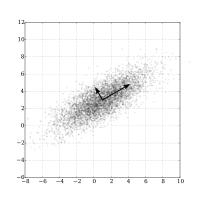
Photo from wikipedia
Massive MIMO based grant-free random access (mGFRA) is a promising RA technique for massive access with low signaling overhead. However, due to a limited orthogonal preamble size, preamble collision is… Click to show full abstract
Massive MIMO based grant-free random access (mGFRA) is a promising RA technique for massive access with low signaling overhead. However, due to a limited orthogonal preamble size, preamble collision is a key factor that constrains the success probability of mGFRA. In this paper, we examine the potential of applying non-orthogonal preambles to mitigate the issue, where two typical non-orthogonal sequences, i.e., Gaussian distribution sequences and Zadoff-Chu (ZC) sequences, are taken into account. Asymptotic behaviors of the success probabilities with the non-orthogonal preamble sequences are analyzed and compared using derived closed-forms. Through the analysis we reveal that ZC sequences outperform Gaussian ones. However, though non-orthogonal sequences are able to reduce or even alleviate the preamble collision, they do not necessarily provide better performance than the orthogonal counterpart. In addition, regarding orthogonal sequences as a single-root case of ZC sequences, we show that there exists an optimal number of ZC roots that maximizes the success probability for mGFRA, which is low-bounded by orthogonal baseline. Simulation results evaluate the performance of non-orthogonal sequences in mGFRA under various practical system parameters, and validate our analysis.
Journal Title: IEEE Transactions on Communications
Year Published: 2020
Link to full text (if available)
Share on Social Media: Sign Up to like & get
recommendations!